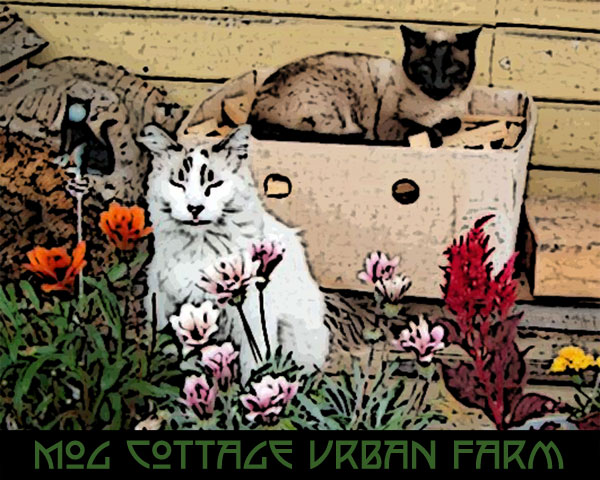Our philosophy is
that vegetable gardening should be fun. There are so many blogs out
there that get serious about things like being successful with your veg.
Yes, that's important, but part of getting there is the discovery of
new techniques through blunders and developing one's own gardening
style. Whatever works for you within the premise of first do no harm.
Harm is in the form of using nasty pesticides as a cure-all instead of a
more comprehensive integrated pest management (IPM) system. Harm is
digging before calling 811 and then busting a gas line. Harm is leaving
tripping hazards on the sidewalk. Harm is not testing your soil for lead
and other chemical content that can be harmful if swallowed. Harm to
your sanity is not getting the required stupid permits to plant in your
parking strip. The city can be a pain in the patootie. We learned the
hard way.
Urban farms are not large. In fact, many are on one or two urban lots. Urban farming is not about acreage. Urban farming is really about supporting food security in a setting that has not always been conducive to this sort of thing. Urban
farmers are any of us who have devoted a goodly proportion of their
property to agriculture; that is edible crops and small livestock.
Excess is often sold, shared and donated. Planting edibles in
one's front yard is still illegal in many municipalities across the
country. It is deemed unsightly, lowering property values. Better to
have a polluting, drab carpet of turf in the front of the house with a
few landscape shrubs hugging the house, ya know.
Years
of heavy metal build-up in depleted soils can leave it dead and not
safe to grow things for human consumption. Veg gardening in urban areas
requires planning. Know thy soil. Know thy sun exposure. Know thy
municipality. Seattle is more progressive than a lot of cities,
promoting edible landscapes and allowing 8 hens and 2 goats to live in
your yard. We have 7 cats and one 5 pound dog, although I'm lobbying the
other half for chickens. Never mind the assortment of visiting 4-legged
wildlife.
We try to re-purpose as
much as possible. Roland has ample stacks of lumber (taking up valuable
potential edible space, I might add!) and we salvage materials that
would work well in an edible landscape. Two clawfoot bathtubs hold herbs
and saffron crocus bulbs. Old pedestal sink bases make great plant
stands. Urbanite, busted up concrete slabs are often used in retaining
walls and instead of flagstone (which is mined, by the way). Recycled #7
nursery containers are planted with tomatoes and beans. A
composting system is in the works to be constructed out of recycled
wood. Cold frames are made out of salvaged old windows (be careful to
pick up any paint chips that come off due to possible lead).
We try to incorporate
low impact development principles. Our garden shed is getting a green
roof. We plan to hold run-off in a rain barrel. I have several ideas
about incorporating rain gardens into the mix. Also, attracting
pollinators and other beneficial (qualifier) wildlife into the
landscape.
Finally,
we are researching incorporating permaculture principles. Following
natural cycles helps your success and the environment.
Edible
gardens don't have to look messy. They can be interesting and
beautiful. In a take-off of a famous William Morris quote, "Have nothing in your garden that you do not know to be useful, or believe to be beautiful."
It's all a work in progress.

No comments:
Post a Comment
Tell me what you think. I'd love to hear your ideas and personal experiences.